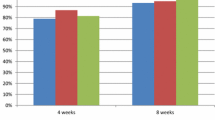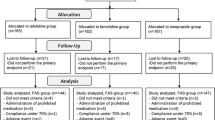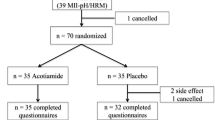Abstract
Objective
Lansoprazole has undergone extensive clinical evaluation for the treatment of acid-peptic diseases. The aim of this study was to define the safety profile of lansoprazole and compare it to that of other therapeutic agents evaluated in the same controlled trials.
Methods
The clinical safety profile of lansoprazole and comparative agents (placebo, ranitidine and omeprazole) was reviewed for 3281 patients who participated in short term (up to 8 weeks) and long term (up to 56 months) clinical trials conducted in the US. Adverse events, laboratory value changes and gastric biopsy changes that occurred during treatment were compared statistically for differences between treatments.
Results
The incidence of adverse events and number of patients discontinuing treatment because of adverse events was similar for lansoprazole and comparative agents. Other than elevated serum gastrin levels, a known effect of proton pump inhibitors, no trends in laboratory changes were observed. Median values for gastrin levels remained within the normal range; about 2% of patients had gastrin levels >400 pg/ml at any time, while <1% had 2 or more gastrin values >500 pg/ml. Values returned to baseline levels after therapy was discontinued. No significant changes in gastric endocrine cell growth from baseline to final visit were observed, nor was there evidence of dysplasia or neoplasia.
Conclusion
Lansoprazole is well tolerated for both short and long term treatment of acid-related disease. The tolerability of lansoprazole is comparable to that of ranitidine, omeprazole and placebo in the treatment of these diseases.
Similar content being viewed by others
References
Robinson M, Sahba B, Avner D. A comparison of lansoprazole and ranitidine in the treatment of erosive oesophagitis. Aliment Pharmacol Ther 1995; 9: 25–31
Feldman M, Harford W, Fisher R. Treatment of reflux esophagitis resistant to Hi-receptor antagonists with lansoprazole, a new H+/K+-ATPase inhibitor: a controlled, double-blind study. Am J Gastroenterol 1993; 88: 1212–7
Lanza F, Goff J, Scrowcroft C. Double-blind comparison of lansoprazole, ranitidine, and placebo in the treatment of acute duodenal ulcer. Am J Gastroenterol 1994; 89: 1191–200
Metz D, Pisegna J, Ringham G. Prospective study of efficacy and safety of lansoprazole in Zollinger-Ellison syndrome. Dig Dis Sci 1993; 38: 245–56
Castell DO, Richter JE, Robinson M, et al. Efficacy and safety of lansoprazole in the treatment of erosive reflux esophagitis. Am J Gastroenterol 1996; 91: 1749–57
Hatlebakk JG, Berstad A, Carling L, et al. Lansoprazole vs om-eprazole in short-term treatment of reflux oesophagitis — results of a Scandinavian multi-centre trial. Scand J Gastroenterol 1993; 28: 224–8
Mee AS, Rowley JS. Rapid symptom relief in reflex oesophagitis: a comparison of lansoprazole and omeprazole. Aliment Pharmacol Ther 1996; 10: 757–63
Robinson M, Lanza F, Avner D, et al. Effective maintenance treatment of reflux esophagitis with low-dose lansoprazole. Ann Intern Med 1996; 124: 859–67
Sontag S, Kogut D, Fleischmann R, et al. Lansoprazole prevents recurrence of erosive reflux esophagitis previously resistant to H2-RA therapy. Am J Gastroenterol 1996; 91: 1758–65
Solcia E, Bordi C, Creutzfeldt W, et al. Histopathological classification of nonantral gastric endocrine growths in man. Digestion 1988; 41: 185–200
Solvell L. The clinical safety of omeprazole. Scand J Gastroenterol 1989; 24 Suppl. 166: 106–10
Joelson S, Joelson IB, Lundborg P, et al. Safety experience from long-term treatment with omeprazole. Digestion 1992; 51 Suppl. 1: 93–101
Das AF, Freston JW, Jacobs J, et al. An evaluation of safety in 37,252 patients treated with cimetidine or ranitidine. Int Med Specialists 1990; 11: 3–14
Klinkenberg-Knol EC, Festen HPM, Jansen JBM, et al. Efficacy and safety of long-term treatment with omeprazole for refractory reflux esophagitis. Ann Intern Med 1994; 121: 161–7
Carlsson E, Larsson H, Mattsson H, et al. Pharmacology and toxicology of omeprazole-with special reference to the effects on the gastric mucosa. Scand J Gastroenterol; 1986; 21 Suppl. 118: 31–8
Ekman L, Hansson E, Havu N, et al. Toxicological studies on omeprazole. Scand J Gastroenterol 1985; 20 Suppl. 108: 53–69
Havu N. Enterochromaffin-like cell carcinoids of gastric mucosa in rats after life-long inhibition of gastric secretion. Digestion 1986; 35 Suppl. 1: 42–55
Freston JW, Borch K, Brand SJ, et al. Effects of hypochlorhyd-ria and hypergastrinemia on structure and function of gastrointestinal cells: a review and analysis. Dig Dis Sci 1995; 40 Suppl.: 50S–62S
Solcia E, Fiocca R, Havu N, et al. Gastric endocrine cells and gastritis in patients receiving long-term omeprazole treatment. Digestion 1992; 51 Suppl. 1: 82–92
Lamberts R, Creutzfeldt W, Struber HG, et al. Long-term omeprazole therapy in peptic ulcer disease: gastrin, endocrine cell growth, and gastritis. Gastroenterol 1993; 104: 1356–70
Rodrigues AD, Freston JW. Do PPI effects on the cytochrome P450 system have implications to significant drug interactions? In: Guile R, Tytgat G, Dameester T, et al., editors. The esophageal mucosa. Amsterdam: Elsevier, 1994: 460–4
Freston JW. Long-term acid control and proton pump inhibitors: interactions and safety issues in perspective. Am J Gastroenterol 1996; 92(4): 51S–7S
Author information
Authors and Affiliations
Corresponding author
Rights and permissions
About this article
Cite this article
Freston, J.W., Rose, P.A., Heller, C.A. et al. Safety Profile of Lansoprazole. Drug-Safety 20, 195–205 (1999). https://doi.org/10.2165/00002018-199920020-00008
Published:
Issue Date:
DOI: https://doi.org/10.2165/00002018-199920020-00008




